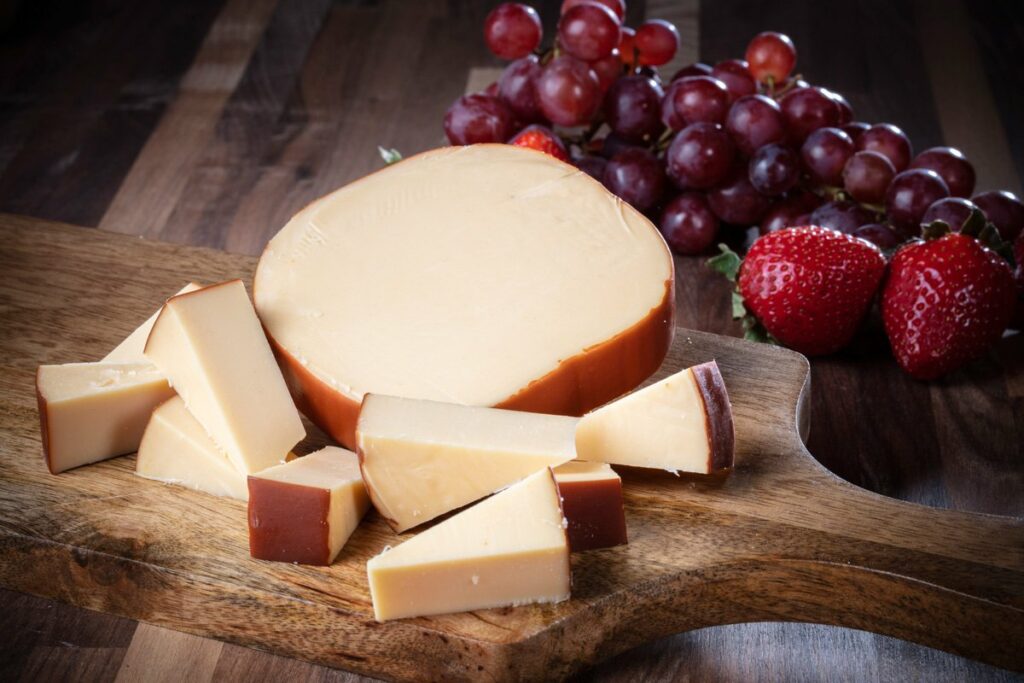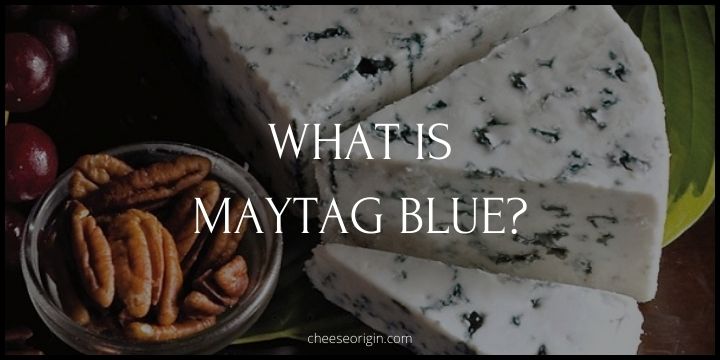What is Smoked Gouda? Unveiling the Creamy, Nutty Delight

Originating from the Netherlands, gouda cheese is a popular type of cheese enjoyed all over the world.
Smoking it, however, adds a whole new layer of depth and flavor. The smoke imparts a slightly nutty, savory taste that makes it a perfect ingredient for bold and spicy dishes or even as a standalone snack.
But not all smoked gouda are created equal. Depending on where it’s made and how it’s smoked, there can be significant variations in taste, texture, and aroma.
This guide will introduce you to the many different types of smoked gouda cheese and help you navigate the vast selection available.
Whether you’re a cheese pro or just discovering the delights of smoked cheese, you’ll find plenty of useful information and tips for enjoying this delicious and versatile cheese. So grab a glass of wine and let’s get started.
Quick Facts About Smoked Gouda
| Smoked Gouda Quick Facts | Description |
|---|---|
| Origin | The Netherlands |
| Milk Source | Traditionally made from cow’s milk |
| Texture | Semi-hard, often with a springy texture |
| Flavor | Rich, creamy, slightly sweet, and smoky. The smokiness can range from mild to strong depending on the smoking process |
| Color | Golden interior with a brown rind due to the smoking process |
| Aging Process | Usually aged for 2-6 months, but can be aged longer for a more intense flavor |
| Protected Designation of Origin | Gouda does not have a Protected Designation of Origin (PDO), meaning it can be made anywhere |
| Historical Origins | Named after the city of Gouda in the Netherlands, where it was historically traded |
| Uses | Popularly used in sandwiches, salads, and gourmet dishes. Also enjoyed as is, paired with a variety of beverages |
What is Smoked Gouda?

Smoked Gouda is a variant of the traditional Gouda cheese that is smoked in brick ovens over hickory or oak wood chips. It originates from the Netherlands, specifically the city of Gouda after which it is named.
Smoked Gouda is made from cow’s milk and has a semi-hard texture, often with a springy feel. The cheese is known for its rich, creamy, slightly sweet taste that is accompanied by a smoky flavor. The intensity of the smokiness can vary depending on the duration and method of the smoking process.
The cheese has a golden interior with a brown rind, which is a result of the smoking process. It is typically aged for 2-6 months, although it can be aged longer for a more intense flavor.
Smoked Gouda is popularly used in sandwiches, salads, and gourmet dishes. It is also enjoyed as is, often paired with a variety of beverages.
What is smoked Gouda cheese good for?
Smoked Gouda cheese is incredibly versatile and can be used in a variety of dishes. Here are some ways you can enjoy this delicious cheese:
- Cheese Platter: Smoked Gouda can be a great addition to any cheese platter, paired with fruits like apples and pears, crackers, or good quality bread.
- Cooking: Its rich, smoky flavor can add depth to many dishes. It can be used in macaroni and cheese, quiches, frittatas, or melted over burgers and sandwiches.
- Baking: Smoked Gouda can be used in cheese bread, muffins, or savory pastries for an extra layer of flavor.
- Soups and Sauces: It can be added to soups and sauces to give them a creamy texture and a unique, smoky taste.
- Salads: Smoked Gouda can be grated or cubed and added to salads for a flavorful twist.
- Pairing with Drinks: It pairs well with a variety of drinks including red wines, dark beers, and even some whiskies.
The best way to enjoy Smoked Gouda is to allow it to come to room temperature before serving. This allows the cheese to fully express its flavors.
What does smoke Gouda taste like? Tasting notes
Smoked Gouda is a cheese full of complexity and depth. Here are some tasting notes to give you an idea of its distinctive flavor:
- Smokiness: As the name implies, Smoked Gouda has a distinct smoky flavor. It’s traditionally smoked in brick ovens over hickory or wood chips, which imparts a deep, rich smokiness that is both savory and slightly sweet.
- Rich and Creamy: Beneath the smoky exterior, Smoked Gouda has a rich, creamy, and buttery taste. It’s made from cow’s milk, which gives it a high fat content and a delectable creaminess.
- Sweet and Nutty: Despite its robust smokiness, Smoked Gouda also has a subtle sweetness. Some people also describe it as slightly nutty, with hints of caramel and toasted nuts.
- Texture: Smoked Gouda is semi-hard with a smooth and dense texture. It’s firm yet flexible, and melts beautifully, making it perfect for cooking.
- Aftertaste: The aftertaste of Smoked Gouda is long-lasting and pleasant, leaving a lingering hint of smoke and sweetness on your palate.
The flavor of Smoked Gouda can vary depending on its age. Younger Gouda tends to be milder and creamier, while aged Gouda develops a stronger, deeper flavor and a firmer texture.
What’s the difference between smoked gouda and regular gouda?
While both Smoked Gouda and Regular Gouda originate from the Netherlands and share a similar base flavor, there are some key differences between the two:
| Feature | Smoked Gouda | Regular Gouda |
|---|---|---|
| Origin | Netherlands | Netherlands |
| Flavor | Rich, creamy, slightly sweet, nutty, with a distinctive smoky flavor | Rich, creamy, slightly sweet, nutty |
| Color | Brownish outer rind due to smoking | Pale yellow |
| Texture | Semi-hard, sometimes firmer due to smoking | Semi-hard |
| Usage | Adds a smoky depth to dishes | Used in a wide variety of dishes |
| Pairings | Dark beers, red wines, whiskies | Beers, white wines |
>> Click here to read our in-depth guide on regular Gouda
Is smoked gouda a healthy cheese?
Smoked Gouda, like most cheeses, can be part of a balanced diet when eaten in moderation. Here are some key health-related aspects of Smoked Gouda:
- Nutrients: Smoked Gouda is a good source of protein, calcium, and Vitamin B-12. A 1-ounce serving provides 10% or more of the daily value for calcium and phosphorus. Each serving also provides 0.65 micrograms of Vitamin B-12, which contributes 27 percent toward your daily intake.
- Vitamin K2: Gouda cheese is extremely high in Vitamin K2, even if the milk it’s made from is not grass-fed. This is due to the bacterial cultures used to ferment milk into cheese.
- Saturated Fats: Like many full-fat dairy products, Smoked Gouda contains saturated fats. While they’re not inherently unhealthy, too much-saturated fat can increase the risk of heart disease. Therefore, it’s important to consume Smoked Gouda in moderation.
- Calories: Be mindful of the calorie content. For example, Emporium Selection Smoked Gouda Cheese has 100 calories per serving.
- Teeth Health: Gouda can contribute to healthy teeth when eaten after meals. In addition to containing calcium, it is low in lactose, which has been shown to damage teeth.
While Smoked Gouda does have health benefits, it should be eaten in moderation as part of a balanced diet due to its high saturated fat and calorie content.
Smoked gouda nutrition facts
The values are based on a 1-ounce serving:
| Nutrient | Amount |
|---|---|
| Calories | 100 |
| Total Fat | 8g |
| Saturated Fat | 5g |
| Trans Fat | 0g |
| Cholesterol | 30mg |
| Sodium | 190mg |
| Total Carbohydrate | 1g |
| Dietary Fiber | 0g |
| Sugars | 1g |
| Protein | 7g |
| Vitamin D | 0% DV |
| Calcium | 20% DV |
| Iron | 0% DV |
| Potassium | 0% DV |
Is smoked gouda a probiotic?
Cheese, including smoked gouda, can contain probiotics due to the fermentation process involved in their production. Probiotics are beneficial bacteria that support gut health. However, not all cheeses are a good source of probiotics.
The level of probiotics in cheese can depend on several factors, such as the specific bacterial cultures used during fermentation, the aging process, and how the cheese is stored and handled. Heat and processing can kill probiotic bacteria, so cheeses that are pasteurized or heavily processed may not have as many probiotics.
If you’re specifically looking for probiotic-rich cheeses, you might want to consider varieties like Gouda, mozzarella, cottage cheese, and some types of cheddar, which are often cited for their probiotic content. As with any health-related matter, it’s a good idea to speak with a healthcare provider or nutritionist to get advice tailored to your individual needs.
Can you melt smoked Gouda cheese?
Yes, you can melt smoked Gouda cheese. Gouda is a semi-hard cheese that’s known for its rich, unique flavor and smooth texture. It melts well, making it a great choice for dishes like grilled cheese sandwiches, macaroni and cheese, fondue, or any recipe where a smooth, creamy melted cheese is desired.
However, keep in mind that the smoking process can sometimes make the cheese a bit firmer, and it may not melt as easily as unsmoked Gouda. So, low and slow is the best approach when melting smoked Gouda to prevent it from burning or becoming rubbery.
Can you eat Gouda cheese on its own?
Absolutely, you can eat Gouda cheese on its own! Gouda has a rich, buttery, slightly sweet flavor and a smooth, creamy texture that many people enjoy. It’s perfect for snacking on its own, but also pairs well with a variety of foods.
You can slice it and eat it with crackers or bread, or cut it into cubes and serve it on a cheese platter with fruits, nuts, and other types of cheese. It also goes well with wine and beer.
Smoked Gouda has a more intense, smoky flavor that can be a delicious snack on its own as well. Just remember to remove the rind before eating, as it’s usually covered in wax which is not edible.
Also read: 11 Best Crackers that Pair Well with Cheese
What goes well with smoked gouda?
1. Food that goes well with smoked gouda
| Food Category | Examples |
|---|---|
| Fruit | Pears, apples, peaches, apricots, cherries, berries |
| Nuts | Spiced nuts |
| Bread/Crackers | Crisp crackers, soft pretzels |
| Breakfast Foods | Scrambled eggs, bacon, egg sandwiches |
| Dinner Foods | BBQ pulled pork, beer brats in blankets, smoked Gouda mac and cheese, grilled eggplant |
| Condiments/Jams | Apricot jam, orange jam, mango chutney, mustard |
Also read: What Fruit Goes on a Charcuterie Board?
2. Beverage that goes well with smoked gouda
| Beverage Category | Examples |
|---|---|
| Wine | Pinot Noir, Cabernet Sauvignon, Chardonnay |
| Beer | Brown Ales, Porters, Smoked Beers |
| Spirits | Bourbon, Whiskey, Scotch |
| Non-Alcoholic | Apple Cider, Cranberry Juice, Grape Juice |
Also read: Best Wine and Cheese Pairings: The Ultimate Guide
Where to buy smoked gouda?
- Amazon: They offer Smoked Gouda Cheese (1 lb) and other variants.
- Wisconsin Cheese Mart: They have Gouda Cheese Smoked.
- Walmart: They offer Dutchmark Refrigerated Smoked Gouda Cheese
- Muranda Cheese Company: They sell cheese aged for two months and then smoked with Hickory and Applewood.
- Gouda Cheese Shop: They sell Smoked Gouda Cheese with a smoky flavor online.
- S Clyde Weaver: They offer Smoked Gouda with a rich and complex flavor.
- Wilson Cheese: They sell one pound of imported gouda cheese with smokey, buttery flavor.
- Burnett Dairy: They have Hickory Smoked Gouda on sale.
Remember to check the availability and delivery options in your area before making a purchase.
The history and origin of smoked gouda
Smoked Gouda, like its unsmoked counterpart, originates from the Netherlands. The cheese is named after the city of Gouda in the South Holland province where it was historically traded.
Gouda cheese dates back to the 12th century and is one of the oldest recorded cheeses in the world still made today. The cheese’s name is not protected, meaning that it can be produced anywhere, not just in the Netherlands. However, “Boerenkaas” is a protected form of Gouda made in the traditional way using unpasteurized milk.
Smoked Gouda is a variant of this classic cheese. It is typically made from cow’s milk, which is pasteurized and then curdled with the addition of cultures and rennet. The curds are cut, drained, and then pressed into circular molds. The cheese rounds are then brined, which gives them their rind and also acts as a preservative. After brining, the cheese is aged for a few weeks to several months depending on the desired flavor profile.
The smoking process that gives Smoked Gouda its distinctive flavor is a relatively recent innovation, reflecting the wider use of smoking as a food preservation method in the 20th century. The cheese is smoked in brick ovens over hickory or wood chips, infusing it with a subtly smoky flavor that complements the rich, creamy, slightly sweet taste of the Gouda. The smoking also darkens the cheese’s rind, giving it a distinctive brown color.
Today, Smoked Gouda is enjoyed worldwide, and appreciated for its smooth texture and unique flavor. Whether served on a cheese board, melted in a sandwich, or used in cooking, it adds a touch of gourmet sophistication to any dish.
Frequently asked questions
1. Is smoked gouda vegetarian?
Smoked Gouda can be both vegetarian and non-vegetarian, depending on the specific ingredients used in its production. Traditional Smoked Gouda is often not vegetarian as it may use animal rennet (an enzyme from calves’ stomachs) in the curdling process.
However, many brands produce vegetarian or even vegan versions of Smoked Gouda. These cheeses avoid the use of animal-derived ingredients, including animal rennet. Instead, they use microbial or vegetable rennet, which is suitable for vegetarians.
For example, the Boar’s Head Smoked Gouda Cheese is listed as a vegetarian product.
There are also dairy-free and vegan alternatives to Smoked Gouda such as those produced by Daiya Foods and other brands, which use plant-based ingredients instead of milk.
It’s always important to check the label or inquire with the manufacturer if you’re unsure about the ingredients in a specific product. Different brands may have different recipes and some might not be suitable for vegetarians or vegans.
2. What are the ingredients inside smoked gouda?
The ingredients in Smoked Gouda can vary slightly depending on the specific brand or recipe, but generally, they include:
- Cultured pasteurized milk: This is the primary ingredient in most cheeses. The milk is pasteurized to kill any harmful bacteria, and then cultured with specific bacteria to start the cheese-making process.
- Salt: This is added for flavor and also helps to preserve the cheese.
- Enzymes: These are typically added to help coagulate the milk and form curds. The enzymes can be animal-derived (rennet) or vegetarian alternatives.
- Annatto (color): Some brands of Smoked Gouda use annatto, a natural colorant derived from the seeds of the achiote tree, to give the cheese its characteristic yellow-orange color.
- Smoke flavor: The cheese is smoked over hickory or other types of wood to give it a distinctive smoky flavor. Some manufacturers may use liquid smoke flavoring instead of actual smoking.
For example, according to the information from Boar’s Head, their Smoked Gouda Cheese includes Gouda and Cheddar Cheese (Milk, Cheese Culture, Salt, Enzymes), Water, Nonfat Milk, Sodium Phosphate, Calcium Propionate (Preservative).
Also, there are dairy-free alternatives available like the one from Follow Your Heart which includes Filtered Water, Coconut Oil, Modified Potato and Corn Starches, Potato Starch, Sea Salt, Natural Smoke Flavor, Olive Extract, and Beta Carotene for Color.
3. How to properly store smoked gouda?
Storing smoked Gouda properly can help maintain its quality and extend its shelf life. Here are the steps:
- Wrap the Cheese Properly: After opening, wrap the smoked Gouda in cheese paper or wax paper, which will allow the cheese to breathe while maintaining the proper level of moisture. Avoid using plastic wrap, as it can cause the cheese to sweat and spoil faster.
- Store in the Right Place: The cheese should be stored in the refrigerator, ideally in the vegetable drawer where the temperature and humidity levels are more stable.
- Regular Check: Check the cheese regularly for signs of mold or spoilage. If you notice any, cut off the affected area before consuming the rest.
- Use within a Reasonable Timeframe: Even when stored correctly, smoked Gouda should be consumed within a few weeks after opening for the best taste and quality.
Remember, always wash your hands before handling the cheese and use a clean knife to cut it. This will prevent the introduction of any bacteria that could cause the cheese to spoil.
Also read:
- The Ultimate Guide to Gruyère: A Swiss Delicacy
- A Guide to Provolone: A Masterclass in Flavor and Versatility
- Pecorino Romano: The Ultimate Guide to Italy’s Age-Old Cheese
- Utz Cheese Balls: The Ultimate Guide (Taste the Tradition)
- The Ultimate Guide to Raclette Cheese: A Melted Delight
- Cheese Curds: The Unsung Heroes of the Dairy World
- Fior di Latte: A Comprehensive Guide to Italy’s Creamy Delight





